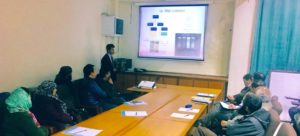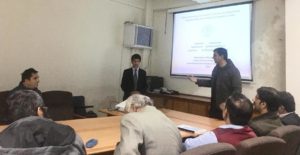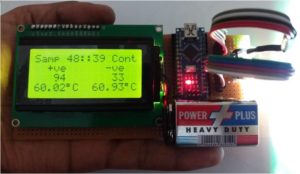 Dr. Naqeebullah Jogezai has become the 1st PhD Scholar of the Department of Biological Sciences, International Islamic University Islamabad by defending his research work here at IIUI.
Dr. Naqeebullah Jogezai has become the 1st PhD Scholar of the Department of Biological Sciences, International Islamic University Islamabad by defending his research work here at IIUI.
Doctor of Philosophy program in Biotechnology was started in year 2013 in International Islamic University Islamabad. Mr. Naqeebullah Jogezai, the first PhD Scholar of Department of Biological Sciences (formerly Department of Bioinformatics and Biotechnology) started his research work in year 2014 in Bio-molecular Engineering Lab (BMEL) under the supervision of Dr. Muhammad Imran Shabbir (Assistant Professor). Mr. Jogezai has successfully gone through his viva-voce/thesis defense examination held on December 10, 2018.
 Mr. Jogezai developed a point-of-care (POC) diagnostic system for rapid detection of HCV infection called as STALLION (Single Tube Analysis using LAMP, LED and ION-sensing). This system is capable of isolating HCV RNA from blood plasma, converting RNA to DNA (Reverse Transcription) and amplifying DNA by Loop-mediated isothermal amplification (LAMP) method and finally detecting the DNA amplification process in real-time by a label-free method of ion-sensing using modified Ion Sensitive Field Effect Transistor (ISFET). The research work appeared in a highly prestigious journal “Analytical Methods” published by “Royal Society of Chemistry”.
Mr. Jogezai developed a point-of-care (POC) diagnostic system for rapid detection of HCV infection called as STALLION (Single Tube Analysis using LAMP, LED and ION-sensing). This system is capable of isolating HCV RNA from blood plasma, converting RNA to DNA (Reverse Transcription) and amplifying DNA by Loop-mediated isothermal amplification (LAMP) method and finally detecting the DNA amplification process in real-time by a label-free method of ion-sensing using modified Ion Sensitive Field Effect Transistor (ISFET). The research work appeared in a highly prestigious journal “Analytical Methods” published by “Royal Society of Chemistry”.
 This work was also supported by the research project entitled “Health Security: Point of Care, Multiplexed Molecular Detection of Infectious Diseases Endemic in Pakistan” approved under “Pakistan-United States Science and Technology Cooperation Program 2016, Mr. Jogezai also visited Micro and Nano Fluidics Lab in School of Mechanical Engineering and Applied Mechanics (MEAM) of University of Pennsylvania (UPenn), Philadelphia, USA for six months under the International Research Support Initiative Program (IRSIP) of Higher Education Commission (HEC) of Pakistan.
This work was also supported by the research project entitled “Health Security: Point of Care, Multiplexed Molecular Detection of Infectious Diseases Endemic in Pakistan” approved under “Pakistan-United States Science and Technology Cooperation Program 2016, Mr. Jogezai also visited Micro and Nano Fluidics Lab in School of Mechanical Engineering and Applied Mechanics (MEAM) of University of Pennsylvania (UPenn), Philadelphia, USA for six months under the International Research Support Initiative Program (IRSIP) of Higher Education Commission (HEC) of Pakistan.
During his stay at UPenn, he modified STALLION system to include fluorescence based detection along with existing ion-mediated detection of DNA amplification. The developed STALLION system is a working prototype in a hand-held format like a glucometer (device for testing blood glucose levels) and is currently tested in the laboratory and soon will be tested in the field. Dr. Shabbir hopes that technology development and improvement is the key to provide better diagnostics and health care facilities to the community.

